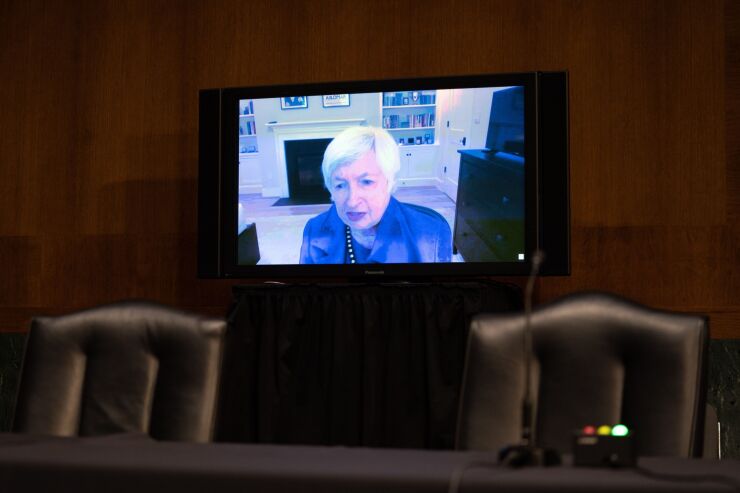WASHINGTON — Limiting the impact of climate change on the financial system and launching a registry of startup companies to combat money-laundering risks are both key priorities for the incoming Biden administration, according to the nominee for Treasury secretary.
Former Federal Reserve Chair Janet Yellen told the Senate Finance Committee that she plans to create a special unit within Treasury to examine risks that climate change poses to the nation's banks and other financial companies.
“I will look to appoint someone at a very senior level to lead our efforts and to create a hub within Treasury in which we particularly focus on financial system related risks and tax policy incentives toward climate change,” Yellen said at her nomination hearing Tuesday. “I think we need to seriously look at assessing the risks to the financial system from climate change.”
Yellen was responding to questions from Sen. Sheldon Whitehouse, D-R.I., who noted that there “is no specific office” within the Treasury Department aimed at addressing the risks of climate change.
Whitehouse also pressed Yellen on the potential impacts of climate change on the housing market.

“Another serious matter is Freddie Mac warning of a coastal property values crash around the country because of climate- change-driven sea level rise,” Whitehouse said.
“I think we should take these risks very, very seriously,” Yellen responded. “I think climate change is an existential threat and both the impact of climate change itself and policies to address it could have major impacts, creating stranded assets, generating large changes in asset prices, credit risks, and so forth that could affect the financial system.”
Yellen also lauded Congress for passing
In a recent defense spending bill, Congress enacted a measure requiring companies to disclose their true owners to Fincen when they go through the process of incorporation. The legislation was partly intended to ease burdens on banks, which up to now have been responsible for identifying and reporting their customers’ beneficial owners.
“I want to thank you and Congress for passing a law that will enable us to identify beneficial ownership of shell corporations and really make a big, big difference in our ability to address terrorist financing,” Yellen said.
Yellen said that she plans to
“This is a very important problem and that the Act that was recently passed by Congress gives us an enormously potent tool to address this problem,” Yellen said. “We will try to get up and running as quickly as possible and devote ourselves to building that database so we can address these issues and will certainly be looking to give this a very high priority.”
Senators also questioned Yellen about Treasury and the Federal Housing Finance Agency's plans to release the government-sponsored enterprises Fannie Mae and Freddie Mac from conservatorship. The two agencies
Sen. Pat Toomey, R-Pa., described housing finance reform as the “great unfinished business of the [2008] financial crisis.”
“While I would prefer going further, at least there is an end to the automatic profit sweep, there is the opportunity to build up capital through retained earnings, there is a capital target now for the GSEs, and there are rules that are meant to limit the acquisition of the riskiest loans by the GSEs,” Toomey said.
Yellen said that the Treasury Department under her leadership “will certainly give priority to studying this issue and coming up with ideas about what should be done.”
Toomey also pressed Yellen about the Financial Stability Oversight Council’s role in designating nonbanks as systemically important financial institutions. He said it was “the right decision” by the Trump administration not to designate asset managers and money market funds as SIFIs.
However, Yellen signaled that she would like to see the return of working groups at the council, which have been disbanded, that examined the risks of high leverage at hedge funds, as well as relatively illiquid mutual funds.
“This is an activities-based approach that FSOC was pursuing and I thought that was the right approach,” Yellen said. “I would hope to look again at some of those approaches.”





